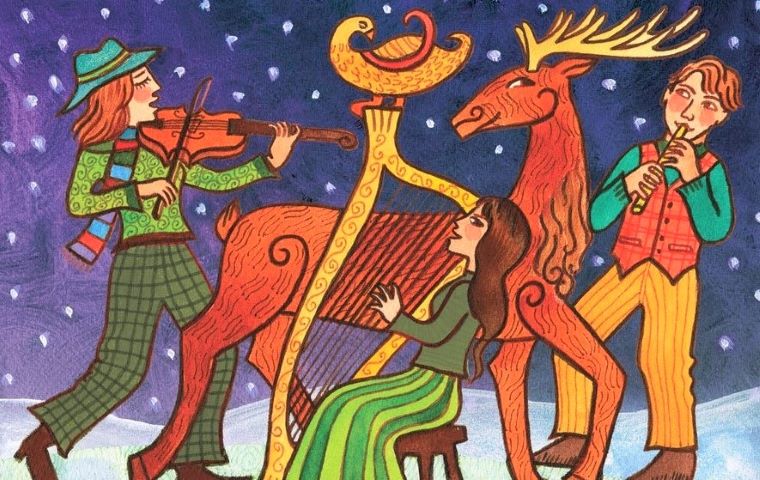
Since practically time immemorial, the holiday season – whether you celebrate Christmas, Chanukah, the Winter Solstice, Kwanzaa, or anything else – has been a time to come together with those you love and treasure.
Of course, many of the seasonal traditions that originated with – and often continue to be celebrated today by – the Celtic peoples, across the seven Celtic nations and the wider Diaspora, share that same focus on coming together to celebrate.
We have explored some of these customs in past issues of Celtic Life International, including Wren’s Day in Ireland, where the community gathers to act out a wren hunt in colourful dress for local kids – a yearly ritual which is believed to have evolved from an ancient Celtic Samhain sacrificial tradition.
Around New Year’s Day, there are several traditions of door-to-door gift-giving of Celtic origin; Calennig in Wales, where it is customary to give out cheese and bread, or some coins; in Scotland, Hogmanay starts at the stroke of midnight with ‘first-footing’ where the first person to cross the threshold of a friend or family member’s house in the new year brings with them a symbolic gift of salt, bread, or a dram of whiskey; Handsel Monday is another opportunity to share gifts in Scotland, with money for children, serving staff, or as a general house-warming present.
Some of these traditions may sound archaic, however many people around the world still observe them.
“My mam used to celebrate Calennig in her village of Ciliau Aeron by rushing around the houses collecting sweets and money,” remembers Becca Hemmings, who owns The Welsh Gift Shop, an online outlet for wares and goods from Wales. “It sounded a bit like today’s Halloween ‘trick or treating’ but without the tricks and costumes. It was always exciting for her.”
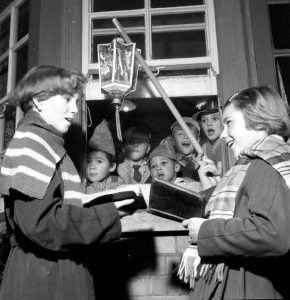
Irish writer Grace Tierney runs the Wordfoolery Blog, which explores the origins behind obscure words and traditions. While ‘Handselling’ might be unknown to most, she grew up with it – even if she didn’t know it by name.
“Handselling a new purse, wallet, or bag with a coin before use has always been part of my life,” she explains via email. “I was very young when my mother explained the custom to me. She knew it was vital for somebody other than the new purse’s owner to place a coin inside before its first use, to ensure the bag would never be empty of future wealth and good fortune.”
Tierney rediscovered the tradition when she came upon the origins of the word “handsel” while researching for her blog. “It appears to have come to English from Danish/Old Norse sources and, as you might guess, related to something being given into the hand. Handsel Day was the day, celebrated from the 1800s, when tips and small gifts were expected by servants, postmen, etc.
“Handsel Day was supplanted by British Boxing Day traditions of the same sort over time, and the day itself doesn’t appear to be celebrated anymore,” she adds. “However, the idea of handselling a purse or wallet has spread far and wide from its source in England, Scotland, and Ireland. It has reached out to Australia, Sri Lanka, and Canada, perhaps along with emigration flows from the British Isles through the centuries. Interestingly, the custom is often handed from mother to daughter.”
Some traditions are even more obscure, to the point of being at risk of fading away altogether.
One such observance is the myth of Apalpador, a Spanish gift-giving, Santa-like figure originating in Galicia.
“Apalpador is a charcoal merchant who lives in the forest and comes down to the villages in the night of Christmas Eve,” explains José Cadaveira of the History Commission of Gentalha do Pichel in Galicia. “He checks to see if the children are well-fed, touching their belly when they are sleeping, saying ‘I wish you well all year’ and leaving charcoal and a handful of chestnuts in the house. This tradition had almost disappeared by 2006. It only remained in some remote zones in the mountains of eastern Galicia: Courel and Ancares. We do not know if, in the past, the tradition was more widely spread, but we suppose so.”
Other traditions, like the festive costumes and pageantry of Wren Day, would travel the world with the Celtic diaspora, and evolve into new, regional variations, like the practice of mummering in Newfoundland and Labrador.
“It is a festive practice where oddly-dressed characters visit homes throughout the evening,” explains Lynn McShane, executive director of the Mummers Festival from the province’s capital city of St. John’s. “Back in the day it served as entertainment during the Christmas season. Considering the isolation of the small coastal communities here at that time, mummering was really a form of entertainment. People would literally grab whatever they could find out of their drawers or their grandmother’s closet, put it on in any kind of shape and size that they could find, and went from house to house. An unwritten rule was, if they guessed who you were, you had to take your mask off and reveal yourself.”
All of these traditions – as well as any that you are likely to observe in your own home – share one thing in common; the coming together to celebrate, ring in the new year, and spread cheer.
Of course, like everything else in 2020, gatherings like these are not really possible this holiday season, as the only thing they would be likely to spread is the COVID-19 virus.
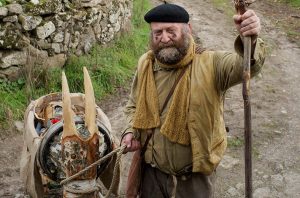 That goes for everyone, no matter what you celebrate. From opening presents under the Christmas tree to lighting the menorah, all of our holiday traditions will likely look quite different this year. But none of those traditions are going anywhere anytime soon – customs like Hogmanay and Apalpador are celebrated today in no small part due to the dedicated revival efforts of people passionate about maintaining their Celtic culture. Losing a year to COVID has only interrupted their comeback momentum.
That goes for everyone, no matter what you celebrate. From opening presents under the Christmas tree to lighting the menorah, all of our holiday traditions will likely look quite different this year. But none of those traditions are going anywhere anytime soon – customs like Hogmanay and Apalpador are celebrated today in no small part due to the dedicated revival efforts of people passionate about maintaining their Celtic culture. Losing a year to COVID has only interrupted their comeback momentum.
Apalpador had largely faded from public memory due to the popularity of the Christian traditions (Santa brings Apalpador’s prized gift – coal – only to misbehaving children, after all). Thus, a concerted effort to improve his image began.
“A huge man disguised as the Apalpador – accompanied by people in traditional Galician costumes and the music of bagpipes – parades the old town of Compostela, distributing handfuls of chestnuts to the children, along with an explanatory leaflet for the grownups,” Cadaveira shares.
“We kept on with the parade every year, and soon schools, town councils, and cultural associations became interested in the Apalpador, and put him in their activities and Christmas plans. Some authors wrote and drew books for children about the character, and now the Apalpador is known all over Galicia.”
A visit from the scruffy gift-giver is slim this year, however.
“We can’t guess what the COVID-19 situation will be in December,” says Cadaveira, “but it will probably be the same as now, in which case this year’s Apalpador parade is in danger of cancelling.”
Larger events are threatened as well. Edinburgh throws an annual Hogmanay Festival, but as was explained via their Twitter account, they threw in the towel in July.
And the Mummers Festival in Newfoundland, which has consistently drawn in thousands of participants in wild-looking garb every year since they began back in 2009, won’t be having their famous parade live on the streets of St. John’s this year either.
“Right now, we are fortunate in Newfoundland that we have no cases of COVID-19,” muses McShane. “However, because of all the Coronavirus protocols and restrictions that the government of Newfoundland & Labrador has in place, the festival will work and look different this year. Unfortunately, even though mummers wear masks already, we are not going to be able to have our traditional cast of thousands like we usually do in the streets of old St. John’s.”
As with so many other aspects of our lives this year, the event is going digital.
The Mummers Festival is more than just the parade; it is two weeks jam-packed with activities and educational opportunities. There are numerous workshops dedicated to helping people master the craft of mummering, from costume construction, to building your own obnoxiously percussive instrument called an Ugly Stick, and building your own hobby horse prop, although likely not from a real horse skull as in days of yore. The festival also offers plenty of academic seminars surrounding the history of mummering, as well as art exhibits and musical performances inspired by mummers, with the help of The Rooms Museum, Archives, and Gallery.
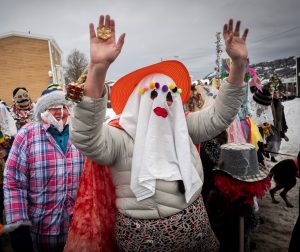
With the availability of broadband Internet and teleconferencing software spreading wider than ever these days, all of these workshops and seminars are still a-go as live steams for the 12th-annual festival. Locals will be able to pre-arrange contactless pickup for mummer costume materials, and for those farther away, a materials list will be shared.
Ironically, the silver lining in this cloudy time is the ability to reach much farther afield than usual.
“We have all kinds of ways that people are going to be able to be involved,” continues McShane. “Wherever they are in the world, not just here in Newfoundland and Labrador. We are envisioning a lot of ex-patriot Newfoundlanders and Labradorians joining in the fun and creating their own pieces of art right along with us.”
Everything is still leading up to a grand finale, but rather than hosting a horde of hobby horses in person, the Mummers Festival is preparing a virtual parade, where people will record their madcap exploits on video and submit them.
“We are going to create a huge video montage, that we will stream on parade day. We think that is going to be fun, too. It makes us sad, but it makes us excited also – about new possibilities, new audiences, new participants from wherever. We are going to be exploring lots of ways to get the word out.”
It is not just the large-scale events finding novel ways to celebrate their favourite Celtic Christmas customs during Coronavirus, either. Hemmings is exploring ways to usher in Calennig at home just inside her family bubble.
“Sadly, we probably won’t be seeing as many family and friends this year as we had hoped, as rushing around to call on neighbours definitely won’t be encouraged. We didn’t celebrate it like my mam did when I was a child, perhaps as it is a bit different in a bigger city. And I won’t be encouraging my children to do it this year either – not very pandemic-friendly!
“But we did make ‘Calennig’ – a lovely-smelling orange, with cloves pushed into the skin,” she adds. “It is a nice, inexpensive activity for children, as they can make different patterns. When my children are a bit older, we will be making these, but this year I plan on giving them each a little gift to celebrate the New Year, perhaps a Welsh language storybook.”
And in the case of Handsel Monday, essential workers have had an exceptionally tasking year, and are the perfect people to surprise with a new purse and a handsome tip.
“This may be a thing of the past, as admittedly we all have fewer servants than we had in the 1800s,” Tierney chimes in. “But I am sure that the people who do help us in our daily lives like mailmen, hairdressers, delivery folk, and volunteers would all appreciate a small gift in January, when even carefully-handselled wallets are emptier than usual after the holiday season.
“I am more likely to handsel our mailman or garbageman before Christmas, not strictly on the January Monday. But this year, rather than handing my card and tip to them in person, I will adapt by leaving it waiting at the mail slot or on the garbage bin. I have no doubt that it will still be welcome.”
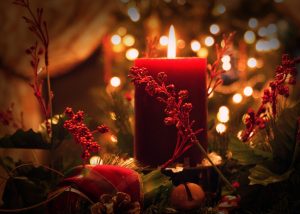
Gift-giving is another holiday custom that can, thankfully, be easily adapted to this unique situation, thanks to modern technology. Online stores like Hemmings’ Welsh Gift Shop not only let you ship a present practically anywhere, but shops like hers even keep items in stock that celebrate these Celtic festivities.
“We created these exclusive ‘Gaeaf’ (Winter) candles which are inspired by Calennig – they have a warm, spicy scent with woody accents.
“Online shopping is a safe and nice way to show someone you are thinking of them, and we love to send a little part of Wales all over the world.”
Things will undoubtedly be different this year, for all of us. But this is hardly the first time these holiday traditions have been interrupted due to unfortunate happenstance. It is not even the first pandemic in living memory to do so, with the Spanish Flu keeping people in quarantine over the holidays in the early 20th century.
The difference is that we now have a bevy of tools at our disposal to maintain contact with our loved ones throughout the holidays, allowing us to keep them in our hearts, if not our hearths. And sometimes, wonderful new traditions are formed out of adversity.
McShane says that, since the founding of the Mummers Festival, she is aware of at least a dozen small communities around Newfoundland and Labrador that have revived their own local mummering activities, just like in the days of old, having been inspired by the festival.
And as self-isolation is now a part of everyone’s reality, she figures that mummering is needed today as much as it was back in the days when tiny communities kept themselves entertained with pillowcase masks. Hopefully, by being available online around the world, they will help inspire new pockets of tradition for people in desperate need of a good laugh.
“Traditions are different everywhere, and that is the great thing about them; they evolve, they are dynamic. The ability to continue live-streaming, I think, is definitely something we will carry on.”
So whether you dress up and ride a hobby horse around your back yard, don a black beret and red beard to leave chestnuts and coal for your kids, or give a little contactless present for your mail carrier, don’t be afraid to see the end of this year out in the traditional ways – just be sure to do so safely.
“I think it is important to keep traditions like this alive, as they part of our heritage,” says Hemmings. “We are hoping 2021 will be a better year than this one – so it will be worth celebrating!”




















Leave a Comment